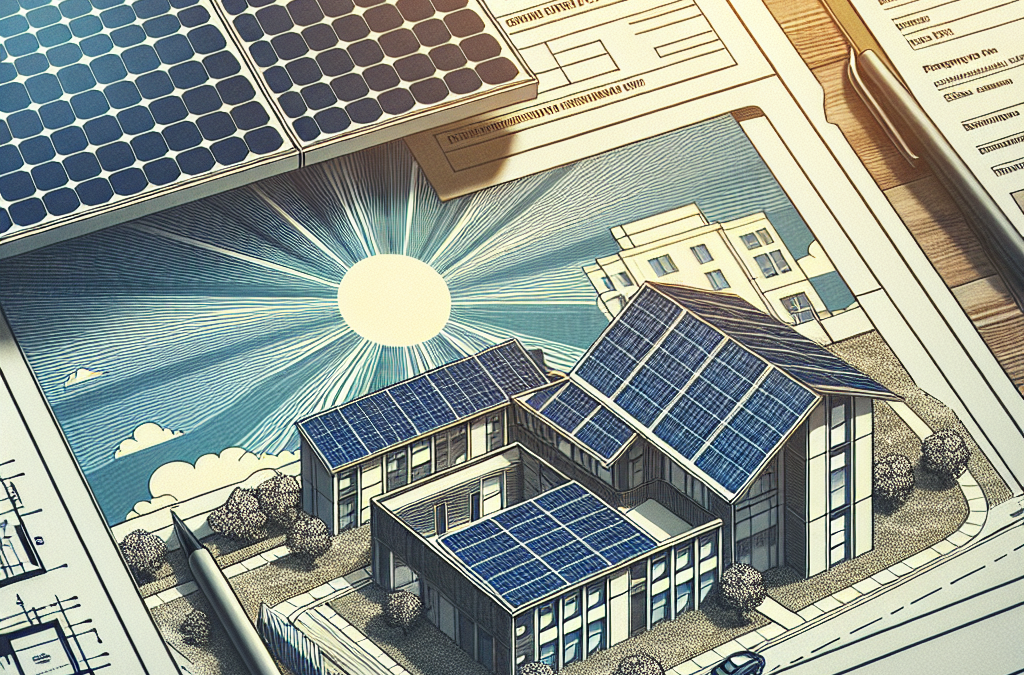So you’re considering installing solar panels on your property, but you’re not quite sure what permits you need to get started. Don’t worry, we’ve got you covered. In this article, we will walk you through the various permits that are required for solar panel installation, ensuring that you have all the necessary paperwork in order to make your transition to clean energy a seamless one. From building permits to electrical permits, we’ll break down the essentials so that you can navigate the process with confidence and peace of mind.
Building Permits
When it comes to solar panel installation, obtaining the necessary building permits is an essential step in ensuring that your project meets all safety and compliance regulations. Building permits are required to ensure that the installation of solar panels adheres to local building codes and ordinances. These permits also help protect the structural integrity of your property and provide assurance that the installation is carried out by licensed professionals.
Requirements for Building Permits
To obtain a building permit for your solar panel installation, you will typically need to fulfill certain requirements. These requirements may vary based on your location, so it is important to consult with your local building department or permitting office for specific guidelines. Generally, the following are some common requirements for building permits:
-
Documentation: You will be required to submit various documents as part of your permit application. This may include architectural drawings, structural plans, and electrical diagrams.
-
Fee Payment: Building permits usually come with a fee that needs to be paid at the time of application. The fee amount differs depending on the scope of your project and the jurisdiction you are in.
-
Project Description: You will need to provide a detailed description of the solar panel installation project. This description should include information such as the size and capacity of the system, the type of solar panels, and the proposed location for installation.
-
Compliance with Codes: Your project must comply with the local building codes and regulations. This includes guidelines regarding setbacks, height restrictions, and other structural considerations. Make sure to review and understand these requirements before applying for a building permit.
Applying for a Building Permit
Once you have gathered all the necessary documentation and fulfilled the requirements for a building permit, it is time to apply. The process for applying for a building permit may vary depending on your location, but generally, it involves the following steps:
-
Visit the Permitting Office: Contact your local building department or permitting office to determine where and how to submit your application. They will provide you with the required forms and guide you through the application process.
-
Complete the Application: Fill out the application form accurately, providing all the required information about your solar panel installation project. Make sure to attach all the necessary documentation, such as architectural drawings and electrical diagrams.
-
Pay the Fee: Submit the required fee along with your application. The fee amount may vary depending on the scope and complexity of your project.
-
Wait for Approval: Once your application is submitted, it will be reviewed by the permitting department. The review process may take a few weeks, depending on the workload and complexity of your project. It is important to be patient during this phase.
-
Receive the Permit: If your application meets all the requirements and complies with the local building codes, you will receive your building permit. This permit allows you to move forward with the solar panel installation.
Inspections and Approvals
After obtaining your building permit, the next step is to schedule inspections during the solar panel installation process. These inspections ensure that the installation is carried out correctly and meets all safety standards. Inspections may include electrical, structural, and safety checks.
Before starting the installation, familiarize yourself with the specific inspection requirements outlined by your local building department. Ensure that all necessary inspections are scheduled and completed at various stages of the installation process, such as after the racking is installed, before the panels are connected to the electrical system, and after the system is fully operational.
It is important to note that the installation must comply with the approved plans and specifications outlined in your building permit. Any changes or modifications to the initial plan may require an amendment to the permit or additional inspections.
Once all inspections are successfully completed, and the solar panel installation is deemed compliant, you will receive the final approval for your project. This approval signifies that your solar panel system is safe and meets all the necessary regulations.
Electrical Permits
In addition to building permits, electrical permits are vital when installing solar panels. These permits ensure that the electrical components of your solar panel system are installed correctly and in compliance with the National Electrical Code (NEC) and local regulations. Electric permits are necessary to maintain the safety and integrity of the electrical system in both residential and commercial installations.
Requirements for Electrical Permits
Obtaining an electrical permit for your solar panel installation typically involves meeting specific requirements. These requirements may vary depending on your location and the complexity of your project. Here are some common requirements for electrical permits:
-
Licensed Electrician: In most jurisdictions, only licensed electricians or contractors can apply for electrical permits. This requirement ensures that the installation is carried out by qualified professionals with the necessary expertise.
-
Electrical Plans and Diagrams: You will need to submit comprehensive electrical plans and diagrams as part of your permit application. These plans should illustrate how the solar panel system will be interconnected to your existing electrical system, including details of wiring, components, inverters, and any changes made to the electrical panel.
-
Compliance with NEC: Your solar panel installation must adhere to the regulations outlined in the NEC. These regulations cover various aspects, including conductor sizing, grounding, overcurrent protection, and isolation requirements.
-
Inspection Coordination: Electrical permits require inspections at various stages of the installation process. Ensure that you coordinate these inspections with your local electrical department to ensure compliance with all safety standards.
Applying for an Electrical Permit
To apply for an electrical permit for your solar panel installation, follow these general steps:
-
Consult with Your Electrician: Discuss your project with a licensed electrician to ensure proper planning and compliance with electrical regulations. They can guide you through the process and help prepare the necessary documentation.
-
Gather Documentation: Collect all the required documentation, including electrical plans, diagrams, and any additional information specific to your project. Make sure all the information is accurate and up-to-date.
-
Contact the Electrical Department: Get in touch with your local electrical department or permitting office to determine the specific requirements and application process for obtaining an electrical permit. They will provide the necessary forms and guide you through the application process.
-
Complete the Application: Fill out the application form, providing all the necessary details about the solar panel installation and the electrical components. Attach the required documentation, including electrical plans and diagrams.
-
Pay the Fee: Submit the required fee along with your application. The fee amount may vary depending on your project’s complexity and the jurisdiction you are in.
-
Inspection and Approval: Work with your licensed electrician to coordinate inspections as required by your electrical permit. These inspections will ensure that the solar panel system is installed correctly and complies with the electrical regulations. Once all inspections are successfully completed and any necessary corrections are made, you will receive final approval for your electrical permit.
Electrical Inspections and Certifications
Electrical inspections are an integral part of the solar panel installation process. These inspections are conducted by qualified electrical inspectors to verify that all electrical work associated with the solar panel system is safe and complies with the prescribed codes and regulations.
The inspections typically include assessments of the wiring, grounding, disconnects, conduit installations, inverters, and other electrical components. The goal is to ensure that the installation meets all safety standards, eliminates potential hazards, and is in compliance with the NEC and local electrical codes.
Upon successful completion of the electrical inspections, you will be issued the necessary certifications of compliance. These certifications are essential for accessing incentives, rebates, and ensuring that your solar panel system is eligible for operation and interconnection with the utility grid.
Remember to keep copies of all electrical permits, inspections, and certifications as they may be required for future reference and by authorities when selling your property or related financial transactions.









